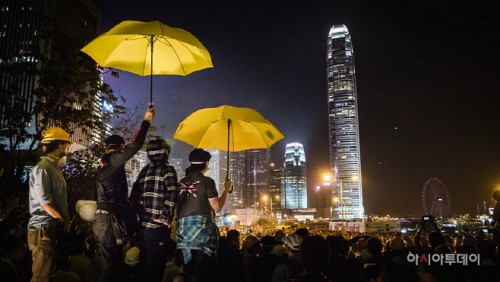 Hong Kong's Umbrella Revolution./ Source: Wikimedia Commons Hong Kong's Umbrella Revolution./ Source: Wikimedia Commons |
By AsiaToday reporter Jina Koh – Will Hong Kong be China in 2047?
A wheel of fortune was set up at the Lunar New Year fair in Victoria Park in Hong Kong. It featured the faces of potential candidates for Hong Kong's next leader who will assume office in July. It was installed by the pro-democracy Civic Party.
As the wheel of fortune cannot determine the fate of Hong Kong, neither can Hong Kongers decide their own fate. And the city's Millennials cry out, "It's fake democracy."
The Civic Party's Alvin Yeung pointed out in an interview with the New York Times on Jan. 27. that whichever candidate the wheel picks, none of them will be the real choice because the upcoming election is not a genuine one.
Previously on Tuesday, nomination of candidates for Hong Kong's chief executive race began in the city. The 1,194 members of the city's election committee will nominate candidates until March 1. An entrant needs 150 nominations from the committee to qualify for the race, and 601 votes to win in the election on March 26. Once approved by the Chinese government, the winner will officially take office in July.
The next Hong Kong leader will be elected via indirect election. Hong Kong citizens do not have the right to vote. At the Chinese National People's Congress (NPC) in August 2014, the Chinese government pronounced that Hong Kong must accept an indirect election system for the chief executive. According to Chinese authorities, the candidates should be "patriots supported by more than half of the nominating committee members." In other words, it's the Chinese leadership who has the right to choose.
Although China justifies itself by promising Hong Kong citizens' direct election system after nominating candidates from the 1,200-member nominating committee, it's obvious that the next chief executive will act as a puppet of China.
China's decision virtually ignored the basic law that guarantees Hong Kong's direct election system, which eventually led to the Umbrella Revolution that shocked the world.
Hong Kong fears its destiny of being fully integrated to China in 2047. The Umbrella Revolution was the outlet for young Hong Kongers to overcome that fear. Citizens, including students, came out on the streets to protest against China's decision.
The demonstration led to the emergence of pro-independence parties and new faces (who are primarily Millennials) calling for the city's right to self-determination.
 Nathan Law (left) and Joshua Wong on July 14, 2015./ Source: AFP, Yonhap News Nathan Law (left) and Joshua Wong on July 14, 2015./ Source: AFP, Yonhap News |
Hong Kong's youngest lawmaker Nathan Law, who was a key student leader of the Umbrella Revolution and later became the chairperson of political party Demosisto, emphasized the pursuit of self-determination after being elected last year.
"I'm not advocating independence, I'm advocating Hong Kong people should enjoy their rights of self-determination," he said. His goal is to push for a referendum to decide Hong Kong's sovereignty status in 10 or 20 years. He also revealed that he will fight against the communist party.
The desire to seek sovereignty just like Mr. Law is more prominent among young people. According to a survey conducted by the Chinese University of Hong Kong (CUHK) in July 2016, more than 17% of poll respondents supported independence for Hong Kong when its 50-year "one country, two systems" agreement expires in 2047. However, the figure was nearly 40% in the 15-24 age group.
The Hong Kong government, under the interference of the Chinese government, is controlling such movement. Last year, the government won the lawsuit seeking to disqualify two pro-independence legislator-elects Sixtus Baggio Leung and Yau Wai-ching who pledged to safeguard the interests of the Hong Kong people with a banner stating "Hong Kong Is Not China" at their swearing-in. The two lawmakers appealed to the court, however the High Court dismissed their appeal.
The court also slapped student leaders Nathan Law, Joshua Wong, and Alex Chow with the charge of participating in an unlawful assembly in August last year. They appealed against the court's decision, and the court hearing will begin in May.
In fact, Hong Kong is a humiliating historical scene for China. After losing the Opium War, China handed over Hong Kong Island to Britain. Under British rule, the island grew to become one of the most democratic cities in Asia.
The "one country, two systems" concept is merely a perfunctory system for Hong Kong people. They are doubtful about this system that claims to allow Hong Kong's autonomous right. If the candidate chosen by the Chinese authorities becomes Hong Kong's chief executive, China's Hong Kong intervention would worsen even further and the city would be fully controlled by China in 2047.
It is highly unlikely that the pan-democratic camp will win in the election. Pro-democracy groups that has some 320 election committee members could take a strategic choice by selecting an opposition-friendly candidate as the next best plan.
The wave of Chinese socialism is inevitable. Hong Kong is in the midst of changing political ideology. When Deng Xiaoping agreed to practice the "one Country, two Systems" policy in 1997, he sought coexistence of political ideas between China and Hong Kong. However, China has no reason to maintain socialism and even adopt the concept of capitalism in order to stick to Hong Kong's democratic method that revived the economy. As long as Hong Kong is under the control of Chinese socialism, the power of the judiciary and freedom of speech will obviously disappear.
2047 is the year in which the “one country, two systems” principle expires. Will Hong Kong's democracy survive in 2047?
#Hong Kong #Umbrella Revolution #democracy #One Country #Two Systems
Copyright by Asiatoday
Most Read
-
1
-
2
-
3
-
4
-
5
-
6
-
7





















